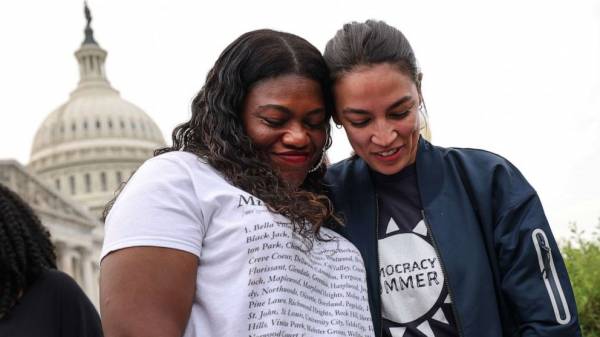
The TAKE with Rick Klein
“Biden Democrats” keep winning primaries over their more progressive friends.
But the Biden agenda is still being shaped and defined by President Joe Biden’s relationship with his party’s left — even as it could derail his most ambitious policy goals.
A primary in a Cleveland-area House district this week added another win for the pro-Biden Democratic establishment, following victories by moderates in the Virginia governor’s race primary and the primary election in New York City.
This week also featured a dramatic exercise in progressive activism, led by Rep. Cori Bush, D-Mo., that forced the administration to address the expiring eviction moratorium after the White House at first indicated it was powerless. Another clash along similar ideological lines is looming around student loan forgiveness.


Kevin Dietsch/Getty ImagesU.S. Reps. Cori Bush, D-Mo., and Alexandria Ocasio-Cortez, D-N.Y., embrace during a rally on the eviction moratorium at the U.S. Capitol on Aug. 3, 2021, in Washington, D.C.
And for all the progress in the Senate’s bipartisan infrastructure bill, uncertainties around its fate in the House cloud any legislative future. Again, it’s progressives — who have prevailed on House leaders to insist that the far larger Democrat-only bill also advance before committing to passing the Senate package — who hold the power to keep things from Biden’s desk.
The dynamics reflect tensions that far predate the 2020 election cycle, though they were evident throughout a long primary race cut short by COVID-19. Progressives — particularly younger ones — have long been skeptical of Biden and his commitment to their causes.
It’s a stretch to say that Biden is bowing to all of their wishes, or captive to their agenda. But it’s not a stretch to point out that his agenda will stall without them on board — regardless of who’s winning primaries.
The RUNDOWN with Averi Harper
The Department of Justice has opened its third investigation into the practices of a local law enforcement agency. The Civil Rights Division of the DOJ announced Thursday it would investigate to determine whether the Phoenix Police Department has engaged in discriminatory policing.
In April, less than 24 hours after former Minneapolis police officer Derek Chauvin was convicted of George Floyd’s murder, the Department of Justice announced an investigation into the practices of the Minneapolis Police Department. The DOJ is also investigating the Louisville Metro Police Department.
“Each time I have noted that these investigations are aimed to promote transparency and accountability,” Attorney General Merrick Garland said. “This increases public trust, which in turn increases public safety.”


Kevin Dietsch/Getty ImagesU.S. Attorney General Merrick Garland announces a federal investigation of the city of Phoenix and the Phoenix Police Department during a news conference at the Department of Justice on Aug. 5, 2021, in Washington, D.C.
While the effort aims to root out discriminatory policing practices, one-off investigations of law enforcement agencies cannot adequately address the issue of police violence or broadly resolve systemic discrimination. There are about 18,000 law enforcement agencies across the country, all with different standards policies and practices, according to the Bureau of Justice Statistics.
The announcement comes as Senate negotiations on a police reform bill have fallen flat as a weekslong Senate recess looms. Legislation remains the most transformative method to addressing police reform, but the passage of any such legislation is a long way off.
The TIP with Alisa Wiersema
A second special session is set to begin in Texas this Saturday, but the partisan standoff over voting rights continues, as Texas House Democrats in Washington show little indication of their next moves.
Abbott’s agenda for the new session carries over Republican priorities that were left unaddressed over the course of the last month due to House Democrats breaking quorum and fleeing to the nation’s capital. “Election integrity” remains among the issues Gov. Greg Abbott said he “will continue to call special session after special session” to resolve, but the agenda also includes items like COVID-19 relief appropriations and legislation to address public school education during the pandemic.


Chip Somodevilla/Getty ImagesTexas state Rep. Senfronia Thompson joins fellow Democratic members of the Texas House and Senate following a news conference halfway through the 30-day special session called by Gov. Greg Abbott at the Washington Plaza Hotel on July 23, 2021, in Washington, D.C.
It remains unclear whether those issues will push Democrats to return to Texas given the state’s escalating battle against COVID-19. During a Thursday press call with reporters, state Rep. Gina Hinojosa said that as the minority party facing off with a Republican majority, the Democrats’ “strategy must be kept secret.”
“What we’re not going to do is be baited into coming back to work on an issue that Democrats have repeatedly tried to advance in numerous sessions where we have received zero Republican support for our measures and so they never advanced,” Hinojosa added.
THE PLAYLIST
ABC News’ “Start Here” podcast. Friday morning’s episode features ABC News’ Stephanie Ramos, who examines a potential vaccine mandate for active duty military. Kaiser News Editor-in-Chief Dr. Elisabeth Rosenthal tells us why the unvaccinated could soon see insurance premiums rise. And ABC News’ Elwyn Lopez takes us to the front lines of a miner strike in Brookwood, Alabama. http://apple.co/2HPocUL
WHAT YOU NEED TO KNOW THIS WEEKEND
Comments (0)Share to FacebookShare to TwitterEmail this article

Sourse: abcnews.go.com


